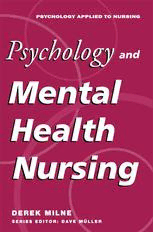
Psychology and Mental Health Nursing PDF
Preview Psychology and Mental Health Nursing
Psychology and mental health nurstnq Psychology Applied to Nursing series Titles in the series Psychology and Mental Health Nursing Derek Milne Psychology of Nursing Care NeilNiven andJillRobinson Psychology and Nursing Children JoDouglas Psychology and mental health nursz•ng Derek Milne Regional Tutor in Clinical Psychology, Northumberland District Psychology Service and the University ofNewcastle upon Tyne Series Editor:Professor Dave Muller Consultant: Erica Joslyn M BP5 THE BRITISH PSYCHOLOGICAL BOOKS SOCIETY MACMILLAN ©Derek Milne 1993 Allrights reserved. Noreproduction, copy or transmission of this publication may be made without written permission. No paragraph of this publication may be reproduced, copied or transmitted save with written permission or in accordance with the provisions of the Copyright, Designs and Patents Act 1988, or under the terms ofany licence permitting limited copying issued by the Copyright Licensing Agency, 90 Tottenham Court Road, London WIP 9HE. Any person who does any unauthorised act in relation to this publication may be liable to criminal prosecution and civilclaims for damages. First published 1993 by BPSBooks (The British Psychological Society), S1. Andrews House, 48 Princess Road East, Leicester LE17DR in association with THEMACMILLAN PRESSLTD Houndmills, Basingstoke, Hampshire RG212XS and London Companies and representatives throughout the world ISBN 978-0-333-57768-4 ISBN 978-1-349-22666-5 (eBook) DOI 10.1007/978-1-349-22666-5 A catalogue record for this book isavailable from the British Library Whilst every effort has been made to ensure the accuracy of the contents ofthis publication, the publishers and author expressly disclaim responsibility in law for negligence or any other cause ofaction whatsoever. In memory and recognition ofmy twin Dennis Milne, who loved tocommunicate his enthusiasm abouthisownsubject Contents List of exercises viii Series Editor's Foreword ix Foreword Philip J. Barker xi Acknowledgements xiv Preface xv Section One Setting the scene 1 Introduction 3 2 The context of mental health nursing 15 Section Two Assessment 3 The assessment process 49 4 Methods of assessment 81 Section Three Planning 5 Planning tasks 109 6 Planning options 128 Section Four Implementation 7 Direct work 155 8 Indirect work 176 Section Five Evaluation 9 Introduction to evaluation 203 10 Evaluating indirect work 238 Section Six Conclusion 11 Themes and implications 259 Index 275 vii List of exercises 2.1 Roles in multidisciplinary teams 16 2.2 A social support exercise 25 2.3 An exercise on environmental factors 35 3.1 An exercise in objectivity 51 3.2 A counselling exercise 68 4.1 Judging an assessment instrument 98 5.1 A stress-coping-strain analysis 117 5.2 Setting training goals 123 6.1 Therapy types 139 7.1 Implementing a care plan 161 8.1 Active listening 184 8.2 The use of adjectives 185 8.3 Communication 186 9.1 Categorising journals as research or evaluation focused 204 9.2 Assessing goals in care plans 215 9.3 Charting a care plan evaluation 226 10.1 Observing social support 245 viii Series Editor's Foreword This book series is designed for the nursing profession and those responsible for teaching nurses on both pre- and post-registration programmes of study. The linking of the nursing curriculum with higher education and the implementation ofProject 2000 has led to a radical revision of nurse education. Many nurses on pre-registration courseswillbestudyingat degreelevelandwillbegainingan academic qualification as well as entry to the nursing Register. These forward looking and exciting changes have led to the need to develop new reading material for nurses to progress both academically and professionally. This is equally true for those nurses post-registration who are committed to enhancing their qualifications base. The expansion in higher education has led to a wide range of part-time degree courses for nurses as well as the linking of post-registration courses such as health visiting and district nursing with higher level academic qualifications. The introduction by the English National Board for Nursing, Midwifery and Health Visiting of the Higher Award for experienced professionals is an important step to facilitate continuing professional developmentfor the nursing profession. This, in turn, has led to the need to bring together nursing and those disciplines akin to professional practice. It has long been recognized that the study of psychology in applied contextsisofmajorimportancebothin learningtobecomeanurseand in moving towards becoming a reflective practitioner. Psychology as the scientific study of human behaviour provides a methodology through which individuals can evaluate the effectiveness of the provisionofcarewithin hospitalsand the community. Psychologyand nursing are both characterized by adopting a scientific and hence an empirical approach to the collection of information and using it to make informeddecisions. The importanceofresearch within the fields ofpsychologyand nursing has led to psychologistsand nurses working together both in terms of curriculum design and in carrying out research to help provide high standards of patient care. Allthe books in the series are characterized by the emphasis placed onthe critical examination ofresearch evidence. Each volume aims to review current practice from a psychological perspective in the light of current research being undertaken by nurses as well as other ix x Series Editor'sForeword professionals. The authors, in bringing together this information, all seek to offer recommendations to inform nursing practice not in a prescriptiveway butin away in whichnurses themselvescan evaluate their practice. Allthe texts are ideal for students studying psychology and nursing for the first time and are written at the appropriate level for inclusion on reading lists for students studying at diploma and degree level. Atthesametime, theapplied research natureof the texts makes them invaluable as a source to support nurses gaining further qualifications as part of their professional development. The textsare contemporary, derivedfrom a strongresearchbase and written by authors with considerable experience of teaching nurses and working with them professionally. I hope that you enjoy this volume in the series and are attracted to the related texts which, taken together, provide nurses with a resource base from which to study psychology as applied to nursing. Professor Dave Muller SuffolkCollege, Ipswich 24September1992
